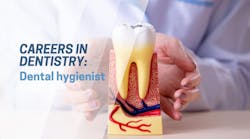Careers in dentistry: Have you ever considered what it would be like, and what it would take, to be a dental hygienist? Here, Kirsten Brancheau, RDH, breaks down what a dental hygienist does, the pros and cons of being a hygienist, and more.
What does a dental hygienist do?
Dental hygienists are oral health-care providers who perform dental cleanings, but that is only one aspect of their job. They are also prevention specialists, helping patients avoid oral and systemic illness. As health-care educators, they teach patients how to attain and maintain oral health as well as teach about the oral-systemic connection, helping patients achieve whole-body health.
Hygienists provide services such as oral cancer screenings, dental sealants, and fluoride treatments. They treat periodontal (gum and bone) disease. Dental hygienists also take medical and dental histories, expose x-rays, take impressions of the teeth, administer local anesthesia, take blood pressure readings, and more. Hygienists are frequently responsible for cleaning and sterilizing their instruments and breaking down and setting up their rooms, maintaining a safe and sanitary environment for their patients and themselves. In addition, they may be responsible for scheduling appointments and generally helping out where needed in the office.
Read also: Careers in dentistry: What is a general dentist?
What are the educational and licensing requirements to be a dental hygienist?
Educational and licensing requirements vary from state to state, but most states require a minimum of two years of dental hygiene education in an accredited school, passing state and national boards, and attainment of a professional license. Most states also require continuing education (CE) to renew licenses.
Individual states’ dental practice acts can be found on their Board of Dentistry/Board of Dental Examiners website. The practice acts include allowable duties, CE requirements, supervision levels, and the rules pertaining to each state.
How much do dental hygienists typically make?
According to the US Bureau of Labor Statistics, the median hourly wage for dental hygienists was $40.80 as of 2022. However, salaries vary greatly according to location. For example, a dental hygienist in Alaska may make over $60 an hour while a hygienist in Alabama may make only $23 an hour. In all states, salaries tend to be higher in bigger cities.
What’s a typical workday for a dental hygienist?
The majority of dental hygienists work in private or corporate-owned dental practices. Some work in specialty offices, including pediatric, orthodontic, and periodontal offices. The number of patients seen in a day varies, depending on the practice. A hygienist in a general practice may see seven to 10 patients a day, while a pediatric office may see more patients, and a periodontal office may see fewer. It depends on the treatment planned and the office policies. Office hours can include evenings and weekends to accommodate working patients.
Some states allow independent practice, where a hygienist can own their own practice without a dentist being present. Some states allow hygienists to work in a dental office without the dentist being physically present, and some states allow hygienists to work only with a dentist physically present in the office. Individual states’ dental practice acts determine how, when, and where a dental hygienist can practice.
What are some pros and cons of being a dental hygienist?
Like any profession, being a dental hygienist has its advantages and challenges. On the plus side, hygienists are usually paid well and are a respected part of the dental team. Often, only a two-year associate’s degree is needed, saving on college costs. The work can be challenging but rewarding as you see patients improve their oral and systemic health with your help. Frequently, hygienists form friendly and trusting relationships with patients, since hygienists tend to spend the most time with them in the office.
The challenges include the physical demands of the job. Hygienists must be ergonomically aware at all times to help avoid injury, especially to the back, neck, and wrists. Stress and burnout may occur when hygienists have no control over their schedules. Some offices expect hygienists to produce a certain amount, adding more stress if goals aren’t met. Frequently, hygienists need to work in more than one office to attain full-time hours, but they don’t always receive benefits, including health insurance and vacation time. Their hours may be cut if the schedule is slow, reducing their salary. Patients can be demanding and difficult.
In spite of the challenges, the dental hygiene career can be extremely rewarding, both financially and emotionally. When a patient with poor oral care returns six months later and proudly shows you their clean, healthy teeth and thanks you for helping them, you will feel the satisfaction of having made a positive change in their life.
I have been a dental hygienist for 46 years. There have been many ups and downs and interesting tales to tell in that time, but looking back, I have no regrets that I chose to become a dental hygienist. It has been a rewarding career.






